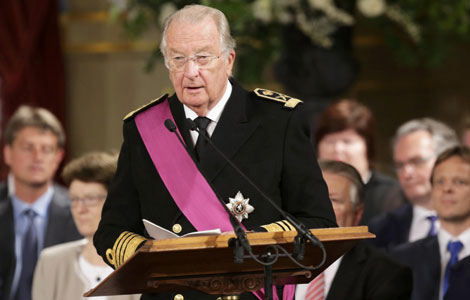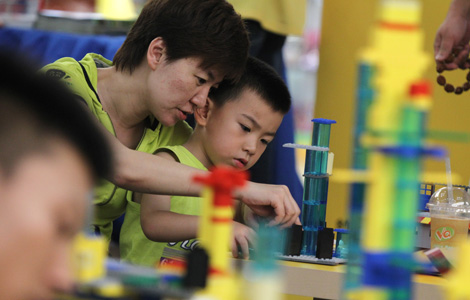Minister rules out stimulus package
Updated: 2013-07-22 08:13
By Zheng Yangpeng (China Daily)
|
||||||||
China brushed off global concerns over its economic slowdown, the latest display of policymakers shifting focus from high growth to structural reforms.
The world's second-largest economy won't seek high growth for the sake of other nations, Finance Minister Lou Jiwei said, ruling out large fiscal stimulus measures to boost growth this year.
"Finance ministers from many other countries expressed their hope to see a higher growth rate from China," he was quoted by Xinhua News Agency as saying on the sidelines of the G20 meeting of finance ministers and central bank governors in Moscow on Saturday.
He was referring to hopes voiced by some of his counterparts at the two-day meeting that China's economy could grow faster to stimulate the global recovery.
"I told them 'do not think about it'. China is comfortable with the condition of its employment. I suggest they take care of their own needed work rather than counting on others," Lou said.
The risk of a hard landing of the Chinese economy is not on the horizon, Lou said. "That issue is not on the agenda of the meeting as no participant even believes the risk exists."
"Although the GDP growth rate is not as high as that of last year, we are seeing more jobs created and more investment directed into the service industry," Lou said. "That shows the increasing vitality of the economy."
In the first half of this year, 7.32 million jobs were created, 38,000 more than the first half of 2012. Analysts said employment is a major economic indicator policymakers consider when deciding whether to step in to boost the economy.
There are other indicators that persuaded policymakers not to launch a large stimulus package, including quickening investment in the service sector and relatively fast growth in electricity output.
The country's GDP in the second quarter grew 7.5 percent year-on-year, slowing from the first quarter's 7.7 percent.
The growth target for the whole year is 7.5 percent.
Lou's comments were widely interpreted as a sign of the new leadership's growing tolerance toward a slowdown.
But an expert said it is important to strike a balance between short-term growth and long-term gain.
"Rebalancing the economy does not necessarily mean sacrificing the growth rate," said Zhou Chunsheng, a finance professor at Cheung Kong Graduate School of Business.
"What worries me is not only that China's broad economic growth has moderated, but at the micro-level, private enterprises are having a very tough time," Zhou said.
G20 targets growth
Facing a fragile recovery and the threat of a new slowdown, G20 members agreed this weekend to prioritize boosting growth and jobs, and to pay less attention to reducing swollen budget deficits.
Finance chiefs from the world's top 20 advanced and emerging economies showed unusual unanimity over the risks and priorities for the economy.
Spooked by the depth of slowdowns in recent years, they clearly agreed that governments had to go full out to create jobs, boost demand and increase productivity.
The economic recovery is fragile and uneven, the finance ministers and central bank chiefs said in their final statement, while unemployment was deemed excessively high in some countries.
"Global economic conditions remain challenging," said Christine Lagarde, managing director of the International Monetary Fund.
Xinhua and AFP contributed to this story.
Most Viewed
Editor's Picks

|

|

|

|

|

|
Today's Top News
Guangdong to probe airport bomber's allegations
Police meets GSK representative after scandal
US protests demand 'justice for Trayvon'
6.6-magnitude quake hits NW China
Minister rules out stimulus package
Top Chinese admiral to visit US this year
Victory improves Abe's hand
Yuan influence on the rise worldwide
US Weekly

|

|














